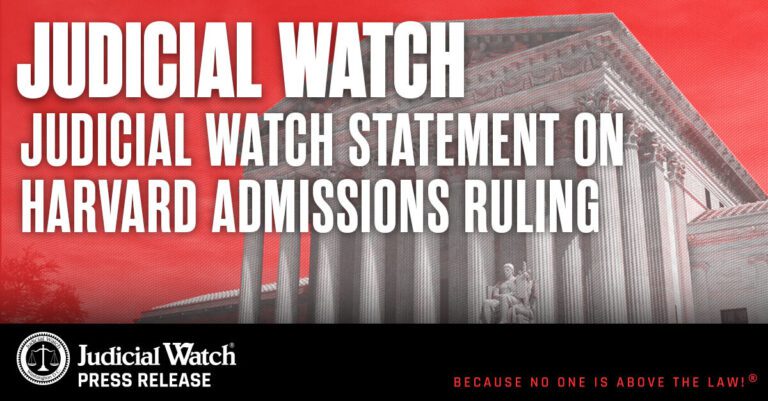

Judicial Watch Statement on Harvard Admissions Ruling


Judicial Watch, Allied Educational Foundation Filed Amici Curiae Briefs in Supreme Court Cases Challenging Harvard, UNC Race-Based Admissions Policies
(Washington, DC) Judicial Watch President Tom Fitton made the following statement regarding the Supreme Court ruling reversing race-based admissions at Harvard College and the University of North Carolina:
It was long past time for the Supreme Court to require our higher education system to follow the Constitution and stop blatant and unconstitutional race discrimination. As the Supreme Court majority observes: “Eliminating racial discrimination means eliminating all of it.”
This decision could not come at a better time, as the extremist left embraces outright racial discrimination, racial separatism, and racial segregation under the guise of “anti-racism.”
As Justice Thomas observed in his concurring opinion:
The solution to our nation’s racial problems cannot come from policies grounded in affirmative action or some other conception of equity. Racialism simply cannot be undone by different or more racialism. Instead, the solution announced in the second founding is incorporated in our Constitution: that we are all equal, and should be treated equally before the law without regard to our race. Only that promise can allow us to look past our differing skin colors and identities and see each other for what we truly are: individuals with unique thoughts, perspectives, and goals, but with equal dignity and equal rights under the law.
Judicial Watch filed several amici curiae briefs alongside the Allied Educational Foundation (AEF) in support of Students for Fair Admissions’ Supreme Court cases challenging both Harvard College and the University of North Carolina’s (UNC) race-based affirmative action admissions programs (Students for Fair Admission v. President & Fellows of Harvard College (No. 20-1199)) and (Students for Fair Admissions, Inc. v. University of North Carolina, et al. (No. 21-707)).
Judicial Watch and AEF argued in their briefs that the court should reject a prior 1978 Supreme Court opinion that seemingly authorizes racial discrimination in college admissions (Regents of Univ. of Cal. V. Bakke, 438 U.S. 265 (1978)). Since Bakke, there have been “at least 26 separate opinions. Many of these have attempted to explain the constitutional rationale for allowing race-based preferences, even though those rationales appear to directly conflict with the original meaning and text of the Equal Protection Clause.”
The amici brief highlighted how race-based discrimination (and the resulting quota mentality) is permeating government. The brief quotes Vice President Kamala Harris’s attack on equality and implicit call for race-based quotas:
There’s a big difference between equity and equality. Equality suggests, “everyone should get the same amount.” The problem with that, not everybody’s starting out from the same place…. Equitable treatment means we all end up in the same place.
Referencing this and other Biden administration actions promoting racial favoritism, the brief noted:
There is, however, no constitutional guarantee that we will all “end up in the same place.” The foregoing statements reveal a distorted view of the Equal Protection Clause that would guarantee racially proportionate outcomes under the name of equity, not the equality of opportunity the Equal Protection Clause has always guaranteed. These are more than mere words or theories. Racial preferences have increasingly become incorporated in real-world, governmental decisions and policies. For example, United States Department of Agriculture (USDA) officials recently sought to use race as a basis for deciding who receives governmental loan forgiveness … In a similar vein, New York issued guidelines … govern[ing] which COVID-19 patients are eligible to receive life-saving monoclonal antibodies and therapeutics [which required] that the patient be a person of color or Hispanic ethnicity.
Last year, Judicial Watch and AEF filed an amici curiae brief in support of the Coalition for Thomas Jefferson High School’s challenge to race-based admissions policies put in place by the nationally known public high school in Fairfax County, Virginia.
In January 2022, the city of Asheville, NC, settled a Judicial Watch federal civil rights lawsuit after agreeing to remove all racially discriminatory provisions in a City-funded scholarship program. Additionally, the city also agreed to remove racially discriminatory eligibility provisions in a related program that provides grants to educators. The City Council approved the settlement on January 11.
Judicial Watch is also challenging a public teachers’ union contract in Minneapolis that requires race discrimination in layoffs and hiring. A Judicial Watch lawsuit also ended a racially discriminatory scholarship program in North Carolina.
The Allied Educational Foundation is a charitable and educational foundation dedicated to improving the quality of life through education. In furtherance of that goal, the Foundation has engaged in a number of projects, which include, but are not limited to, educational and health conferences domestically and abroad. AEF has partnered frequently with Judicial Watch to fight government and judicial corruption and to promote a return to ethics and morality in the nation’s public life.
###















